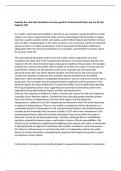Evaluate the view that devolution has been good for Scotland and Wales, but not NI and
England. (30)
As a whole, asymmetrical devolution in the UK has not resulted in unjust benefits to certain
nations over others. Arguments that claim so fail to acknowledge that devolution is largely
based on a public mandate within each nation, and therefore England and Northern Ireland
have not been ‘disadvantaged’ in this sense as there is not as strong of a desire for devolved
powers as there is in Wales and Scotland. Current asymmetrical devolution settlements
adequately reflect the desire for devolution in each nation, and therefore have been ‘good’
for all areas of the UK.
The asymmetrical devolution system in the UK is often cited in arguments as to why
devolution has failed, due to the fundamental imbalances in devolved power between the
regions in the UK. Some devolved regions have gained significant fiscal powers; for example,
Scotland has a devolved assembly with the ability to set their own rates of income tax; the
Government of Wales Act 2014 granted control over corporate tax and stamp duty,
advanced by the 2017 Act which allowed variation of income tax by 10p in the pound. By
Comparison, Northern Ireland has had no further powers devolved since the Belfast
Agreement, which provided no comparable fiscal powers, such as control over income tax or
stamp duty. This concludes how the disparity between legislative and fiscal powers in the
devolved regions has been beneficial for Scotland and Wales, yet has significantly deprived
NI of equal legislative powers, thus suggesting that asymmetrical devolved powers have
engendered inequality between regions and their devolved powers.
However, this argument is limited as it fails to consider the reasons for why such legislative
inequality occurs between regions. Scotland has been allocated greater devolved powers
due to the history of independence, the size of the region, and the desires for
independence, reflected in the 2014 independence referendum with 43% of the electorate
in support of independence. There is a far weaker a mandate for further devolution or a
comparable desire for independence in NI, and government failures over devolved powers,
revealed by the Renewable Heat Incentive scandal in 2017 which saw a breakdown in the
devolved government, reflects how further devolution may not be within the scope of
Stormont, at least for the foreseeable future. Therefore, although there is undoubtedly
legislative inequality between regions, particularly in terms of fiscal responsibilities, this
should not be considered as objectively benefitting certain nations over others as devolution
is allocated based on regional circumstances like a public mandate for more local powers;
NI’s absence of fiscal powers is not inherently ‘bad’ as it adequately matches the public
desires for limited devolution, outweighing the argument that regional inequality is unjust
and deprives certain nations.
Furthermore, the argument surrounding England’s unequal devolved powers in comparison




